SPECIAL REPORT : Part 476
Actually LKI owed public an explanation as to why it never addressed the accountability issue and related matters in spite of it being the toughest foreign affairs challenge faced in post-independence era. There is no harm in addressing a variety of issues of interest but the failure on the part of the LKI to examine this issue by initiating a wider discussion is inexcusable. This criticism also applies to the Kotelawela Defence University (KDU) as it continues to ignore this vital issue.
By Shamindra Ferdinando
Three years after Sri Lanka formally withdrew from an accountability resolution moved against our own country, instigated by the West and the US in particular, the UN body has reiterated that Sri Lanka’s political and military leaderships are under investigation in ‘third states,’ therefore subjected to extraterritorial jurisdiction.
A treacherous Yahapalana government co-sponosred the US-led resolution at the Geneva-based United Nations Human Rights Council.
UNHRC is certainly a club for the rich and powerful, who can kill millions of innocents and render millions more homeless in places like Iraq, Libya, Afghanistan, Syria, etc., by staging turmoil by way of rebellions, regime changes and invasions on false excuses and even commit outright war crimes, but getaway scot-free if you are a member of the self-appointed international community. But a country like little Sri Lanka has no such luck simply because we simply defied the above criminal international community and managed to defeat the world’s most ruthless terrorist organization, despite their underhand nourishment given to it by repeatedly claiming that our security forces were incapable of militarily defeating the LTTE.
UN Deputy High Commissioner for Human Rights Nada Al-Nashif issued the unmistakable warning on 21 June at the 5th session of the HRC. The Jordanian (and her country is a well-known servile follower of the West) dealt with the 2015 US-Sri Lanka joint resolution on reconciliation, accountability and human rights.
Nashif declared that a special team assigned for Sri Lanka that had been established in their Geneva Office to continue to make progress pursuant to resolution 51/1. She stressed: “The team is in the process of providing concrete support to several jurisdictions that have ongoing criminal justice investigations. It is conducting proactive investigative work on key cases and collecting, consolidating and analyzing information and evidence from a variety of UN and other sources, which is preserved in a repository so as to be used for future accountability initiatives. Victims continue to be placed at the heart of this work, including through our active engagement with victim organizations and civil society more broadly.”
Mahajana Eksath Peramuna (MEP) leader Dinesh Gunawardena, who announced Sri Lanka’s withdrawal in March 2020 from the treacherous 2015 accountability resolution, in his capacity as Foreign Minister, is the Prime Minister today. Perhaps Premier Gunawardena should explain the Wickremesinghe-Rajapaksa government’s response to the latest UN declaration.
The then Prime Minister Ranil Wickremesinghe, who gave the go ahead for the signing of the 2015 Geneva resolution, is the President and Commander-in-Chief of the Armed Forces today. President Wickremesinghe, accompanied by First Lady Maithree, was in Europe when Geneva issued the warning. The delegation included National Security Advisor Sagala Ratnayake.
Maithripala Sirisena, under whose watch the co-sponsorship of Geneva resolution took place, is a lawmaker representing the ruling Sri Lanka Podujana Peramuna (SLPP) while war-winning President Mahinda Rajapaksa, too, represents the same party in Parliament. The war-winning Army commander Field Marshal Sarath Fonseka represents the main Opposition Samagi Jana Balawegaya. Unfortunately, none of them at least bothered to exercise their privileges as members of Parliament to counter unsubstantiated allegations.
Obviously with the full blessings of Washington, the Canadian Parliament, in May last year, passed a resolution claiming Tamil genocide in Sri Lanka, unchallenged. A year after the Canadian declaration, retired Rear Admiral Sarath Weerasekera, MP, in his capacity as the Chairman of the Sectoral Oversight Committee on National Security, has suggested that Foreign Minister Ali Sabry, PC, should move a resolution in Parliament to counter the Canadian move. In response to the writer’s query, the Foreign Ministry assured that the suggestion would be dealt with, in consultation with President Wickremesinghe.
In the absence of a cohesive mechanism to counter the Geneva project, the UN has exercised maximum pressure on Sri Lanka. Unfortunately, successive inane governments have simply kicked the can down the road by quite conveniently failing to address war crimes accusations head on by simply exposing to the whole world the double standards of the UN body. By remaining silent those unfairly targeting us have only been given further opportunity to pursue high profile political project meant to introduce a new Constitution at the expense of Sri Lanka’s unitary status.
We as a country should get someone competent to take our case to the world full time, putting aside whatever our political differences.
Except for forthright lawmaker Gevindu Cumatatunga, no one in Parliament has ever declared that the proposed new Constitution should reflect Sri Lanka’s triumph over separatist Tamil terrorism. The leader of civil society organization ‘Yuthukama’ strongly pushed the Gotabaya Rajapaksa’s administration to take the eradication of terrorism into consideration in post-war reconciliation process. Unfortunately, forced by circumstances, and Western intelligence services, and some of their key diplomats working in not so mysterious ways against it, day and night, the erratic GR administration didn’t heed such advice.
The latest Geneva declaration should be examined along with the Canadian declaration of genocide, though for a few days some tended to believe Ottawa was divided over its Sri Lanka stand. But, in response to a specific query as regards the genocide charge, the Canadian High Commission in Colombo reiterated their commitment to 18 May Tamil genocide remembrance day.
Role of LKI
One-time Foreign Secretary Ravinatha Aryasinha, on 19 June, 2023, received appointment as Executive Director, Lakshman Kadirgamar Institute of International Relations and Strategic Studies. The appointment was made by Foreign Minister Ali Sabry in his capacity as Chairman of the Board of Management of the institute. Other members of the board are Suganthie Kadirgamar, widow of the slain much-loved Minister, Rajan Asirwatham, a member of President Chandrika Bandaranaike Kumaratunga’s delegation for talks with the LTTE, Thusantha Wijemanna, one-time legal advisor to External Affairs Ministry, and Malinda Seneviratne, former CEO/Director, Kobbekaduwa Agrarian Research and Training Institute.
Aryasinha retired in September 2021 having last served the country as Sri Lanka’s Ambassador in Washington. Before taking up that appointment in December 2020, Aryasinha served as Foreign Secretary for nearly two years during a turbulent period.
The appointment of Aryasinha took place at a time Geneva has taken an unmistakably dangerous course against us, with Nashif declaring relentless pursuit of Sri Lanka, now at the mercy of Western powers due to an unprecedented financial crisis, leading to IMF loan facility in March this year, entirely on its terms.
It would be pertinent to mention that it was Aryasinha who endorsed the Geneva resolution, in 2015, after some behind-the-scene arm twisting by the then shameless Yahapalana government. In spite of his strong opposition to the resolution, Aryasinha, in his capacity as Sri Lanka’s Permanent Representative in Geneva, had no option but to accept the resolution following instructions issued by the then Foreign Minister, the late Mangala Samaraweera. The then Premier Ranil Wickremesinghe gave the go ahead for the US-led resolution. President Maithripala Sirisena, too, gave his tacit support in terms of the Yahapalana agreement.
Perhaps Aryasinha, now at the LKI’s helm, can pave the way for an in-depth examination of the entire gamut of issues – ranging from UN Secretary General’s Panel of Experts’ investigation into the circumstances Sri Lanka brought the war against the Liberation Tigers of Tamil Eelam (LTTE) to a successful conclusion in May 2009, to the most recent declaration that universal and extraterritorial jurisdiction would be applied against Sri Lanka.
The incumbent government shouldn’t turn a blind eye to the UN backing for investigation and prosecution of the alleged perpetrators and support to the relevant accountability processes in third States, as well, as what it called fair application of targeted sanctions against credibly alleged perpetrators. The reference is very clear. Nada Al-Nashif obviously referred to sanctions imposed by the US and Canada, as well as other countries, including Australia, on the war-winning military. Among those who had been sanctioned were former President Mahinda Rajapaksa, former President Gotabaya Rajapaksa, Field Marshal Sarath Fonseka, Admiral of the Fleet Wasantha Karannagoda, Chief of Defence Staff General Shavendra Silva and Maj. Gen. Chagie Gallage.
In fact, LKI owed the public an explanation as to why it never addressed the accountability issue and related matters in spite of it being the toughest foreign affairs challenge faced in post-independence era. There is no harm in addressing a variety of issues of interest but the failure on the part of the LKI to examine this issue by initiating a wider discussion is inexcusable. This criticism also applies to the Kotelawela Defence University (KDU) as it continues to ignore this vital issue.
Mannar mass graves
Sri Lanka never really exploited the exposure of the blatant UNHRC lie over Mannar mass graves to counter unsubstantiated lies propagated by interested parties. The Western propaganda project regarding Mannar mass graves at one point threatened to overwhelm Sri Lanka but the then Yahapalana government was determined to keep quiet about it.
The Office of UN High Commissioner for Human Rights obviously threw its weight behind those propagating lies. The UN became part of the lie. The Mannar mass graves was accommodated in the annual report of the then UN High Commissioner for Human Rights Michelle Bachelet.
The Commissioner went to the extent of referring to the Mannar mass grave site in her latest annual report (section 23) submitted to the UNHRC. The following is the relevant section: “On May 29, 2018, human skeletal remains were discovered at a construction site in Mannar (Northern Province), Excavations conducted in support of the Office on Missing Persons, revealed a mass grave from which more than 300 skeletons were discovered. It was the second mass grave found in Mannar following the discovery of a site in 2014. Given that other mass graves might be expected to be found in the future, systematic access to grave sites by the Office as an observer is crucial for it to fully discharge its mandate, particularly with regard to the investigation and identification of remains, it is imperative that the proposed reforms on the law relating to inquests, and relevant protocols to operationalize the law be adopted. The capacity of the forensic sector must also be strengthened, including in areas of forensic anthropology, forensic archaeology and genetics, and its coordination with the Office of Missing Persons must be ensured.”
What Bachelet never expected was the US report on Mannar mass graves to go against its strategy. A report by a reputed Miami-based laboratory on the Mannar mass grave samples cleared the Army of the responsibility for extra-judicial killings.
The remains of over 300 men, women and children were found, beginning early 2018, and resulted in high profile accusations of battlefield killings and extra-judicial execution of civilians. Although in terms of the Indo-Lanka Accord that was forced on then President JR Jayewardene by New Delhi, the Indian Army, too, had been deployed there during July 1987 to January 1990, but the know-all UNHRC bluntly pointed the finger at the Sri Lanka Army. During the Indian deployment, the Sri Lankan military was confined to barracks, not only in Mannar, but also the entire northern and eastern administrative districts.
The carbon testing report from the internationally recognized US laboratory concluded that the victims likely died up to 615 years ago — predating even the first European colonization of the country by the Portuguese. That was the end of the sensational Mannar mass grave accusation. But as expected the Tamil National Alliance (TNA) that once served as the LTTE’s representative in Parliament, rejected the US report.
A TNA lawmaker, representing the Vanni region, called for a fresh testing in another lab in some other country. Our Vavuniya correspondent Dinasena Ratugamage quoted Mullaitivu District MP Nirmalanathan Sivamohan as having said:” This is not to say that we do not accept the reports sent by a lab in Florida, US, but given the importance of the Mannar grave site we need to get a second opinion.”
The MP insisted that the lab in Florida had not attempted to identify the victims and further tests were necessary to determine the identity of those in the graves.
A section of the local and foreign media spearheaded a high profile campaign on the basis of Mannar mass graves. Some Colombo-based diplomats, too, supported the project. The then German Ambassador in Colombo, Joern Rohde, visited the site on 27 November, 2018. The German envoy’s visit was followed by a British delegation on 11 December, 2018. The British visit took place close on the heels of the discovery of two pieces of human bones, bound by a cable, on 07 December, 2018. The recovery prompted some ‘experts’, as well as those engaged in excavating the mass grave, to speculate whether some of the people buried there had been tortured before being killed. Interests shown in the Mannar mass grave site by those countries, pushing for full implementation of the Geneva Resolution, unfortunately co-sponsored by the then servile government in Sri Lanka, in October, 2015, strengthened the campaign directed at the Army. A section of the Catholic clergy, too, facilitated the project meant to blame the Army over the Mannar mass grave.
During the propaganda campaign over the Mannar mass graves, the Foreign Ministry and Army Headquarters did absolutely nothing because the then government cooperated fully with the Geneva project. The Yahapalana government response to Mannar was in line with its handling of Lord Naseby’s revelations in October 2017. Even to date, Sri Lanka never made a genuine attempt to use the House of Lords member’s disclosure to our advantage.
On the basis of Foreign and Commonwealth Office (FCO) records obtained with the intervention of the Information Commissioner’s Office, Lord Naseby challenged the very basis of the October 2015 Resolution. Sri Lanka refused to take advantage of the revelation that countered two major allegations (1) killing of 40,000 civilians on the Vanni east front and (2) Sri Lanka political and military leaderships deliberately targeted the civilian community.
The British disclosure coupled with wartime US Defence Advisor Lt. Colonel Lawrence Smith’s declaration in support of Sri Lanka, in June 2011, two years after the conclusion of the war, would help Sri Lanka to build a strong case.
The latest UN warning again highlights Sri Lanka’s pathetic failure to set the record straight. Sri Lanka should place all available information before the international community even if they won’t accept our version.
How govt. ignored JD’s assertion
One of Sri Lanka’s celebrated career diplomats, the late Jayantha Dhanapala, discussed the issue of accountability when he addressed the Lessons Learnt and Reconciliation Commission (LLRC), headed by one-time Attorney General, the late C. R. de Silva, on 25 August, 2010.
Dhanapala, in his submissions, said: “Now I think it is important for us to expand that concept to bring in the culpability of those members of the international community who have subscribed to the situation that has caused injury to the civilians of a nation. I talk about the way in which terrorist groups are given sanctuary; harboured; and supplied with arms and training by some countries with regard to their neighbours or with regard to other countries. We know that in our case this has happened, and I don’t want to name countries, but even countries which have allowed their financial procedures and systems to be abused in such a way that money can flow from their countries in order to buy arms and ammunition that cause deaths, maiming and destruction of property in Sri Lanka are to blame and there is therefore a responsibility to protect our civilians and the civilians of other nations from that kind of behaviour on the part of members of the international community. And I think this is something that will echo within many countries in the Non-Aligned Movement, where Sri Lanka has a much respected position and where I hope we will be able to raise this issue.”
Dhanapala also stressed on the accountability on the part of Western governments, which conveniently turned a blind eye to massive fundraising operations in their countries, in support of the LTTE operations. It is no secret that the LTTE would never have been able to emerge as a conventional fighting force without having the wherewithal abroad, mainly in the Western countries, to procure arms, ammunition and equipment. But, the government never acted on Dhanapala’s advice.
Instead the Mahinda Rajapaksa government squandered over USD 6 mn on a foolish US project in 2014 that didn’t help Sri Lanka at all. That project was meant to thwart the 2015 US resolution in Geneva. The rest is history.
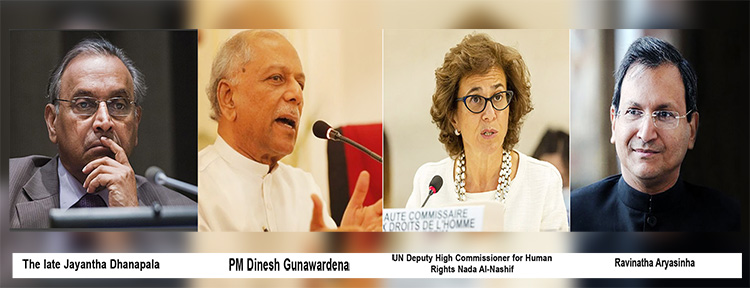
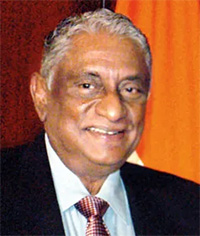 Actually LKI owed public an explanation as to why it never addressed the accountability issue and related matters in spite of it being the toughest foreign affairs challenge faced in post-independence era. There is no harm in addressing a variety of issues of interest but the failure on the part of the LKI to examine this issue by initiating a wider discussion is inexcusable. This criticism also applies to the Kotelawela Defence University (KDU) as it continues to ignore this vital issue.
Actually LKI owed public an explanation as to why it never addressed the accountability issue and related matters in spite of it being the toughest foreign affairs challenge faced in post-independence era. There is no harm in addressing a variety of issues of interest but the failure on the part of the LKI to examine this issue by initiating a wider discussion is inexcusable. This criticism also applies to the Kotelawela Defence University (KDU) as it continues to ignore this vital issue.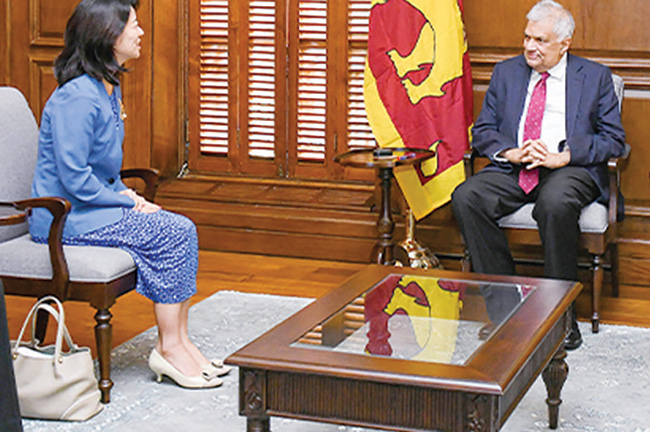
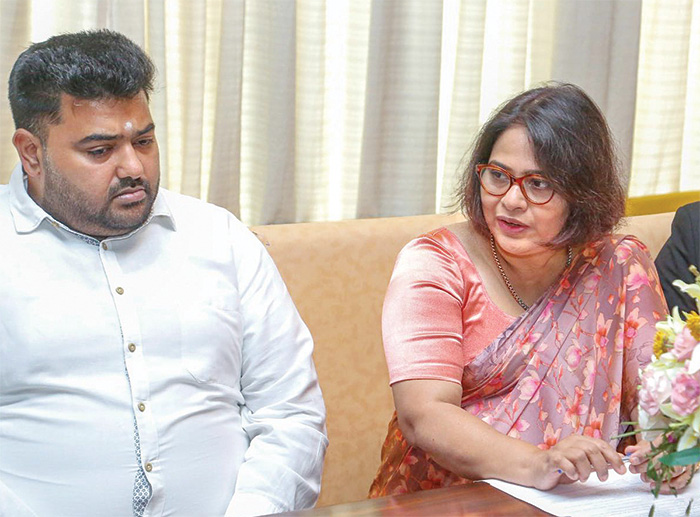
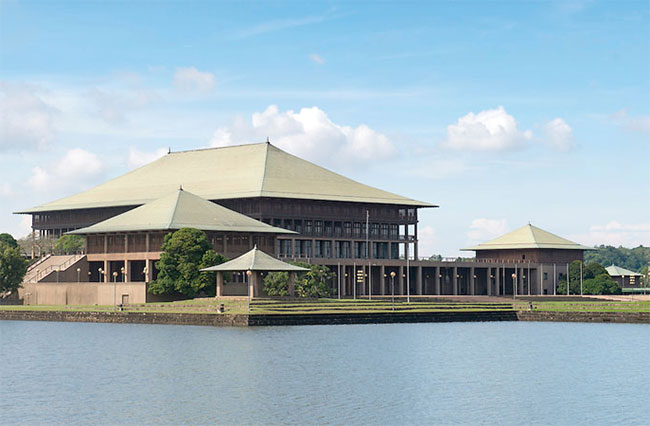
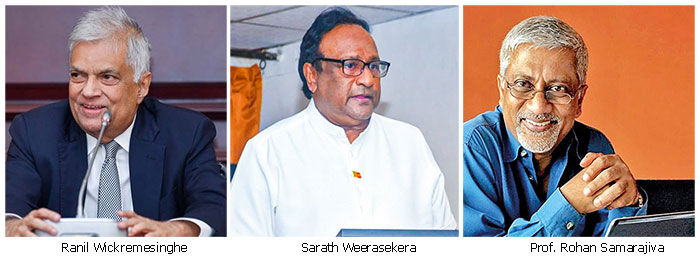 Now that PMD has declared the final decision on SLT privatization would be taken at the Cabinet, let me discuss the Yugadanavi deal that was challenged in the Supreme Court by three members of the then President Gotabaya Rajapaksa’s Cabinet.
Now that PMD has declared the final decision on SLT privatization would be taken at the Cabinet, let me discuss the Yugadanavi deal that was challenged in the Supreme Court by three members of the then President Gotabaya Rajapaksa’s Cabinet.